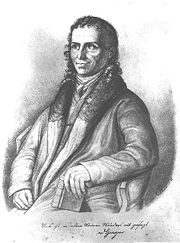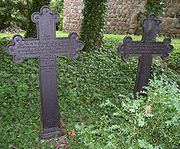
Friedrich Heinrich von der Hagen
Encyclopedia


Germany
Germany , officially the Federal Republic of Germany , is a federal parliamentary republic in Europe. The country consists of 16 states while the capital and largest city is Berlin. Germany covers an area of 357,021 km2 and has a largely temperate seasonal climate...
philologist, chiefly distinguished for his researches in Old German
Old German
Old German usually refers to Old High German, but it could also refer to:*Old Low German *Altdeutsche Tracht , a dress style popular among early 19th century German radicals...
literature.
He was born at Angermünde
Angermünde
Angermünde is a town in the district of Uckermark in the state of Brandenburg, Germany. It is located on the Mündesee, 43 miles northeast of Berlin on the Berlin–Szczecin railway...
-Schmiedeberg in the Uckermark
Uckermark
Uckermark is a Kreis in the northeastern part of Brandenburg, Germany. Neighboring districts are Barnim and Oberhavel, the districts Mecklenburgische Seenplatte and Vorpommern-Greifswald in Mecklenburg-Vorpommern, and to the east Poland . It is the largest district of Germany areawise...
region of the Margraviate of Brandenburg
Margraviate of Brandenburg
The Margraviate of Brandenburg was a major principality of the Holy Roman Empire from 1157 to 1806. Also known as the March of Brandenburg , it played a pivotal role in the history of Germany and Central Europe....
. After studying law at the University of Halle, he obtained a legal appointment in the state service at Berlin, but in 1806 resigned in order to devote himself exclusively to letters. In 1810 he was appointed professor extraordinarius of German literature at the University of Berlin
Humboldt University of Berlin
The Humboldt University of Berlin is Berlin's oldest university, founded in 1810 as the University of Berlin by the liberal Prussian educational reformer and linguist Wilhelm von Humboldt, whose university model has strongly influenced other European and Western universities...
in the following year he was transferred in a similar capacity to the University of Breslau, and in 1821 returned to Berlin as professor ordinarius. Although von der Hagen's critical work is now entirely out of date, he is credited with awakening an interest in old German poetry.
Principal publications:
- the NibelungenliedNibelungenliedThe Nibelungenlied, translated as The Song of the Nibelungs, is an epic poem in Middle High German. The story tells of dragon-slayer Siegfried at the court of the Burgundians, how he was murdered, and of his wife Kriemhild's revenge....
, of which he issued four editions, the first in 1810 and the last in 1842 - the Minnesinger (Leipzig, 1838-1856, 4 vols. in 5 parts)
- Lieder der altern Edda (Berlin, 1812)
- Gottfried von Strassburg (Berlin, 1823)
- a collection of Old German tales under the title Gesammtabenteuer (Stuttgart, 1850, 3 vol.)
- Das Heldenbuch (Leipzig, 1855).
- Die Thidrekssaga.
He also published Über die älteslen Darstellungen der Faustsage (Berlin, 1844); and from 1835 he edited Das neue Jahrbuch der Berlinischen Gesellschaft der deutsche Sprache und Altertumskunde. His correspondence with Christian Gottlob Heyne
Christian Gottlob Heyne
Christian Gottlob Heyne was a German classical scholar and archaeologist as well as long-time director of the Göttingen State and University Library.-Biography:He was born in Chemnitz, Electorate of Saxony...
and Georg Friedrich Benecke
Georg Friedrich Benecke
Georg Friedrich Benecke was a German philologist. In 1814 he became professor at the University of Göttingen. Benecke was editor of a dictionary to Hartmann von Aue's Ywain .- External links :...
was published by K Dziatzko (Leipzig, 1893).

